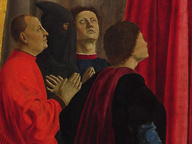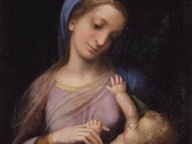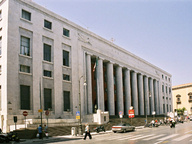Screen Tearing
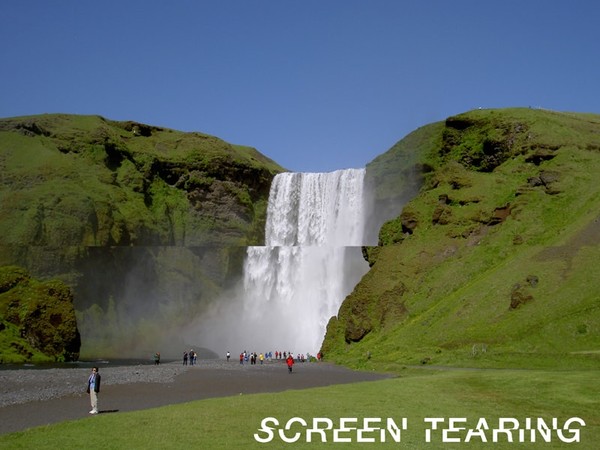
Screen Tearing, Dimora Artica, Milano
From 06 Febbraio 2019 to 07 Marzo 2019
Milan
Place: Dimora Artica
Address: via Dolomiti 11
Times: Saturday, Sunday, Monday 4.00 - 8.00 pm, other days by appointment
Responsibles: Dimora Artica
Telefono per informazioni: +39 380 5245917
E-Mail info: dimoraartica@gmail.com
Official site: http://www.dimoraartica.com/
Dimora Artica inaugurates the new exhibition place presenting Screen Tearing, a collective exhibition with works from seven artists born between 1988 and 1992. The exhibition project starts from the desire to investigate changes in perceiving reality through the works from a generation born and raised in a world dominated by the pervasiveness of technology and digital communication.
The increasingly widespread diffusion of computers, internet and smartphones has imposed new methods of storing and exchanging information, determining new ways of perceiving the world. The superabundance of information that comes from the web and their organization in screens and windows always available through mobile devices are opening new scenarios towards a fluid dimension where endless possible realities can be recalled with a click through a search engine or a hashtag.
As digital communication evolves, genetic engineering is spreading widely, making biological processes manipulable. Robotics becomes increasingly sophisticated, presenting machines and organic based devices able to interact seamlessly with people. In this scenario boundaries between true and false, natural and artificial decline in favor of a hybrid reality in which narrative fiction, biotechnologies and androids become constituent elements of contemporary reality.
Technology is becoming soft, ergonomic, light, efficient, but nevertheless areas of imponderability remain in which the distracted flow of images is interrupted in favor of a greater problematic aesthetic experience.
Influenced by recent technological transformations, last years’ artistic research expresses its cultural impact, without making a simple and banal copy but always focusing on the complexity of evolutionary processes, often combining craft techniques with futuristic shapes or slowing down the visual rhythm to engage the sight in a meditative dimension.
The phenomenon is similar to screen tearing, a digital mechanism for which an altered image is generated from two or more similar basic frames. The process, due to a difference in the refresh rate between source and monitor, generates a new and unexpected image, possible but not real, in which the error becomes an active subject in the generation of the form. Like an image generated by a screen tearing process, art creates moments of incongruity in the linearity of ordinary vision, stimulating attention and opening up to different interpretative possibilities.
The increasingly widespread diffusion of computers, internet and smartphones has imposed new methods of storing and exchanging information, determining new ways of perceiving the world. The superabundance of information that comes from the web and their organization in screens and windows always available through mobile devices are opening new scenarios towards a fluid dimension where endless possible realities can be recalled with a click through a search engine or a hashtag.
As digital communication evolves, genetic engineering is spreading widely, making biological processes manipulable. Robotics becomes increasingly sophisticated, presenting machines and organic based devices able to interact seamlessly with people. In this scenario boundaries between true and false, natural and artificial decline in favor of a hybrid reality in which narrative fiction, biotechnologies and androids become constituent elements of contemporary reality.
Technology is becoming soft, ergonomic, light, efficient, but nevertheless areas of imponderability remain in which the distracted flow of images is interrupted in favor of a greater problematic aesthetic experience.
Influenced by recent technological transformations, last years’ artistic research expresses its cultural impact, without making a simple and banal copy but always focusing on the complexity of evolutionary processes, often combining craft techniques with futuristic shapes or slowing down the visual rhythm to engage the sight in a meditative dimension.
The phenomenon is similar to screen tearing, a digital mechanism for which an altered image is generated from two or more similar basic frames. The process, due to a difference in the refresh rate between source and monitor, generates a new and unexpected image, possible but not real, in which the error becomes an active subject in the generation of the form. Like an image generated by a screen tearing process, art creates moments of incongruity in the linearity of ordinary vision, stimulating attention and opening up to different interpretative possibilities.
SCARICA IL COMUNICATO IN PDF
matteo gatti ·
agostino bergamaschi ·
nat lia trejbalov ·
davide dicorato ·
francesco pacelli ·
marco schiavone ·
alan stefanato ·
agostino bergamaschi davide dicorato matteo gatti francesco pacelli marco schiavone alan stefan
COMMENTI

-
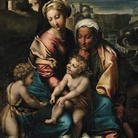 Dal 31 gennaio 2024 al 04 maggio 2025
Fermo | Palazzo dei Priori
Dal 31 gennaio 2024 al 04 maggio 2025
Fermo | Palazzo dei Priori
-
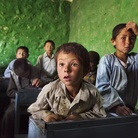 Dal 20 dicembre 2024 al 04 maggio 2025
Fermo | Palazzo dei Priori
Dal 20 dicembre 2024 al 04 maggio 2025
Fermo | Palazzo dei Priori
-
 Dal 20 dicembre 2024 al 04 maggio 2024
Gorizia | Palazzo Attems Petzenstein
Dal 20 dicembre 2024 al 04 maggio 2024
Gorizia | Palazzo Attems Petzenstein
-
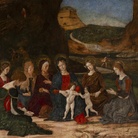 Dal 18 dicembre 2024 al 18 dicembre 2024
Venezia | Museo Correr
Dal 18 dicembre 2024 al 18 dicembre 2024
Venezia | Museo Correr
-
 Dal 14 dicembre 2024 al 02 marzo 2025
Palermo | Palazzo Abatellis
Dal 14 dicembre 2024 al 02 marzo 2025
Palermo | Palazzo Abatellis
-
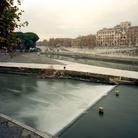 Dal 12 dicembre 2024 al 23 febbraio 2025
Roma | Palazzo Altemps
Dal 12 dicembre 2024 al 23 febbraio 2025
Roma | Palazzo Altemps
